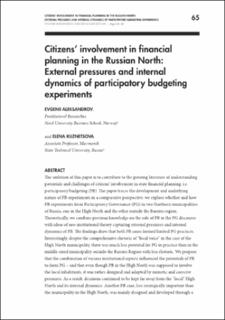Citizens’ involvement in fnancial planning in the Russian North: External pressures and internal dynamics of participatory budgeting experiments
Peer reviewed, Journal article
Published version
Permanent lenke
https://hdl.handle.net/11250/2660360Utgivelsesdato
2019Metadata
Vis full innførselSamlinger
Originalversjon
Aleksandrov, E. & Kuznetcova, E. (2019). Citizens’ involvement in fnancial planning in the Russian North: External pressures and internal dynamics of participatory budgeting experiments. Barents Studies, 6(1), 65-86.Sammendrag
The ambition of this paper is to contribute to the growing literature of understanding potentials and challenges of citizens’ involvement in state financial planning, i.e. participatory budgeting (PB). The paper traces the development and underlying nature of PB experiments in a comparative perspective: we explore whether and how PB experiments form Participatory Governance (PG) in two Northern municipalities of Russia, one in the High North and the other outside the Barents region. Theoretically, we combine previous knowledge on the role of PB in the PG discourse with ideas of neo-institutional theory capturing external pressures and internal dynamics of PB. The findings show that both PB cases formed limited PG practices. Interestingly, despite the comprehensive rhetoric of “local voice” in the case of the High North municipality, there was much less potential for PG in practice than in the middle-sized municipality outside the Barents Region with less rhetoric. We propose that the combination of various institutional aspects influenced the potentials of PB to form PG – and that even though PB in the High North was supposed to involve the local inhabitants, it was rather designed and adopted by mimetic and coercive pressures. As a result, decisions continued to be kept far away from the “local” High North and its internal dynamics. Another PB case, less strategically important than the municipality in the High North, was mainly designed and developed through a combination of normative pressures and internal managerial logic. Our paper thus shows the significance of existing institutional relations (external pressures and internal dynamics) between the central and local authorities in the formation of participatory mechanisms such as PB.

